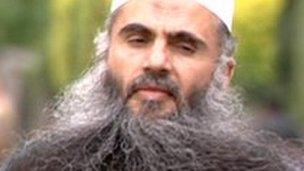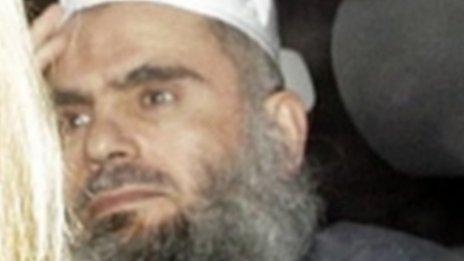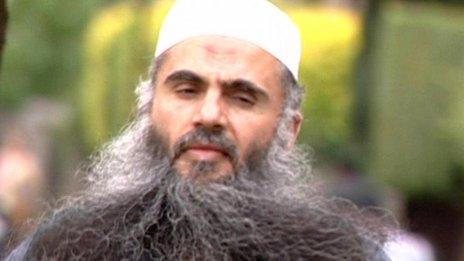Abu Qatada: Prince Hassan tells UK to 'reach out' to Jordan
- Published

Abu Qatada is now free but under strict bail conditions
Prince El Hassan of Jordan has urged Britain to "reach out" to Jordan over the Abu Qatada case.
Home Office minister James Brokenshire has been visiting the country seeking assurances on Abu Qatada's treatment if he were extradited there.
The prince - uncle of King Abdullah - urged Britain to "take the necessary guarantees as a friendly country."
The European Court of Human Rights (ECHR) has blocked Abu Qatada's deportation to Jordan.
It says evidence obtained by torture might be used against him there.
Last week a judge ended Abu Qatada's six-year detention in the UK after a European court ruling.
Abu Qatada was convicted in absentia in Jordan of alleged involvement in a plot to target Americans and Israeli tourists during the country's millennium celebrations.
The BBC's George Alagiah asked the prince if he was able to give any assurances about Abu Qatada.
Prince El Hassan of Jordan: "We have an independent judiciary"
Prince El Hassan replied: "I would like to say this is a country that has never taken the life of a political opponent of the regime.
"But if this man has committed crimes which is presumably why he is being held in England, I don't know what kind of court one has to offer to the Europeans. Does it want a juvenile court?"
Mr Alagiah replied: "They want a court in which evidence brought about by torture is not admissible."
"That is rich coming from a country that believed in rendition agreements," the prince responded.
Asked if the Jordanian legal system was up to European standards, Prince El Hassan replied: "If we live up to British standards I think it's up to British to reach out to Jordan and take the necessary guarantees as a friendly country.
"This is essentially a British European conversation and I don't think democracy means that we have to appeal to every single European parliamentarian."
Abu Qatada was freed on Monday under strict bail conditions,, external including a 22-hour curfew that allows him to leave home only for a maximum of an hour twice a day. He has also been electronically tagged.
He is banned from attending a mosque, leading prayers, publishing any statement, or meeting any of 27 named individuals. Use of a mobile phone or the internet is also prohibited.
- Published14 February 2012

- Published26 June 2014

- Published13 February 2012
- Published14 February 2012
- Published9 February 2012

- Published8 February 2012

- Published6 February 2012
